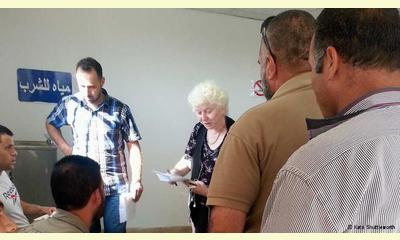|
|
'Princesses of the wall' united against Israeli occupation
an article by Deutsche Welle (DW)
The Israeli women of Machsom Watch have won respect
and criticism for monitoring checkpoints. There's
one thing the activists agree on: Israel's
occupation is damaging and must come to an end.

Sylvia Piterman advises Palestinian workers who have been blacklisted by Israel
click on photo to enlarge
Every morning before the sun rises, an Israeli
women's group of mainly retired grandmothers,
travels to the epicenter of the daily conflict
between Israelis and the Palestinians. Their
stated purpose is to monitor checkpoints between
Israel and the West Bank, but their role is far
from that of silent observers.
The women have fans and foes - some refer to them as
the "princesses of the wall" for the work they do to
help Palestinians, while others see them as anti-
Israeli and an obstruction.
At this time in her life Sylvia Piterman, 67, could
be quietly enjoying her retirement; instead, the
Israeli Jew volunteers full time advocating for
Palestinians who have had their permits to enter and
work in Israel revoked.
She joined the women-only organization Machsom Watch
10 years ago, after she left a senior post at the
Bank of Israel.
Piterman's early morning shift at the Bethlehem
checkpoint bordering the Palestinian territories of
the West Bank is far from her former life behind a
desk as an economist and foreign exchange manager.
Along with two other Machsom Watch women she
monitors the flow of people through the Bethlehem
checkpoint. On her Sunday shift this week, 6,500
Palestinians had passed through the checkpoint by 7
a.m.
This week she found the humanitarian gate open,
allowing women, children and the elderly to pass
through, escaping the huge crowds of men who queue
to cross into Jerusalem to get to work on time.
"When the checkpoint is very slow, we call here
and there and complain," Piterman says. "All kinds
of telephone centers were opened for us because
our ladies used to call the generals in the early
hours of the morning. They didn't like it so much,
so they opened a humanitarian hotline."
"It's good because sometimes we can make the life
of these people a little easier."
The women of Machsom Watch oppose the occupation
and the separation wall.
"There is no real claim against the fact that it's
occupied territory," says Piterman. "It's occupied
territory and we are against it. The way we have
to demonstrate against it is to come to the
checkpoint and stand here."
She would not say what pushed her into the rare
position as a Jewish Israeli woman supporting
Palestinian people, but admitted she was initially
reluctant to get involved with the all-women
group.
"I saw an all-women group as a kind of
discrimination," she says. "At some point I
started going to the checkpoints and I found that
in some ways we exploit the fact that we are
women. Men become very violent in these
situations, and the soldiers see that we are
grandmothers, so they behave differently towards
us, to the people themselves."
[ Note: Thank you to Janet Hudgins, the CPNN
reporter for this article]
(This article is continued in the discussionboard)
|








|
DISCUSSION
Question(s) related to this article:
Do idealistic initiatives have an impact on history?,
* * * * *
Latest reader comment:
| Quote (CPNN Administrator @ June 29 2003,08:20) | | Readers' comments are invited about this discussion question or about the article on which it is based. |
I believe that only idealistic initiatives have a postitive impact on history. I am thinking of the positive outcomes of the work of Gandhi and Desmond Tutu -- two idealistic, smart and committed people. Due to the many difficulties their historical movements, faced their positive impact seemed uncertain.
Similarly In the case of Isreal in Palestine the positive outcome of idealistic peace initiatives also does not seem certain now. However, in the future the impact will be clear in retrospect. PEACE WILL REIGN!!

|
|








